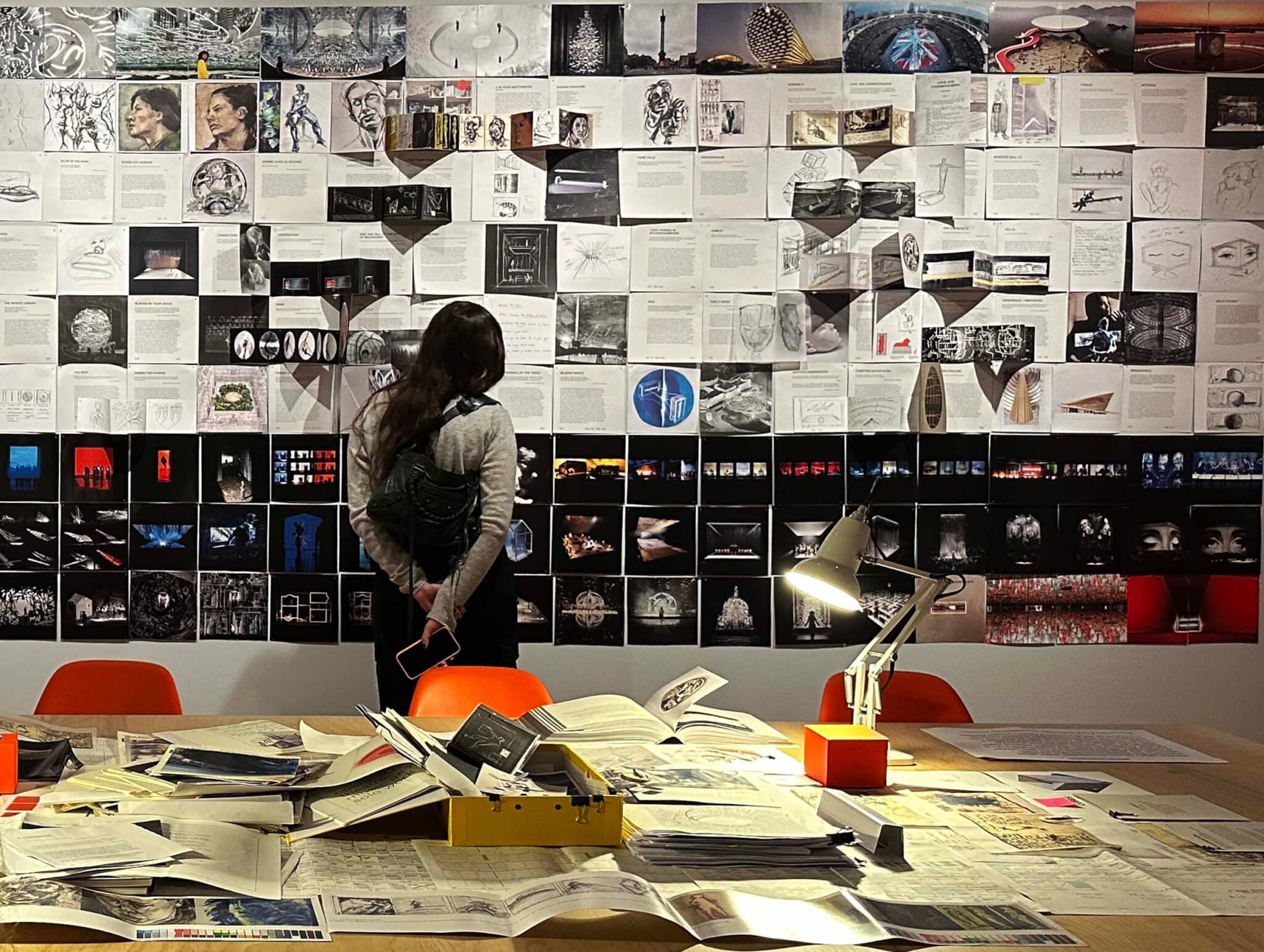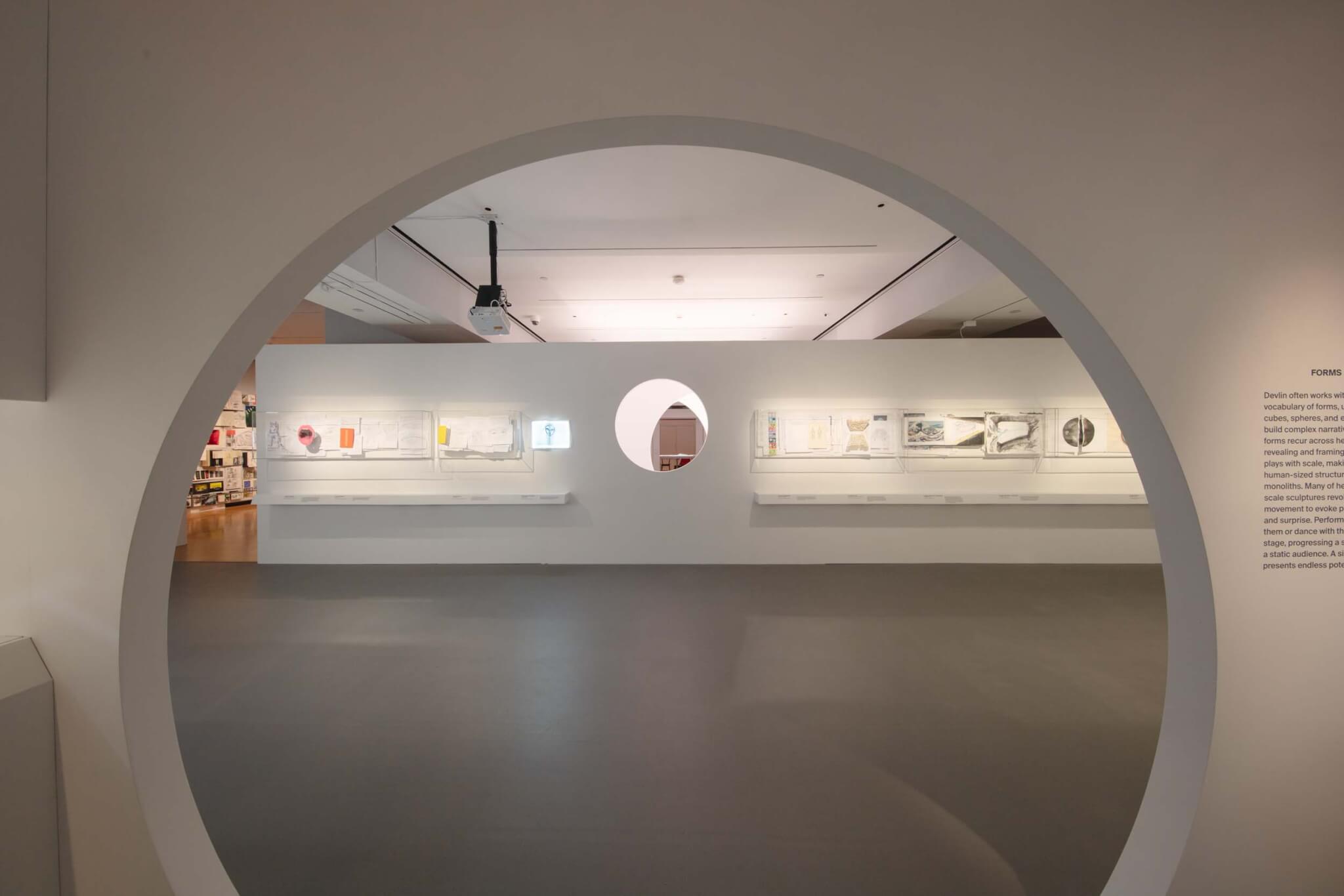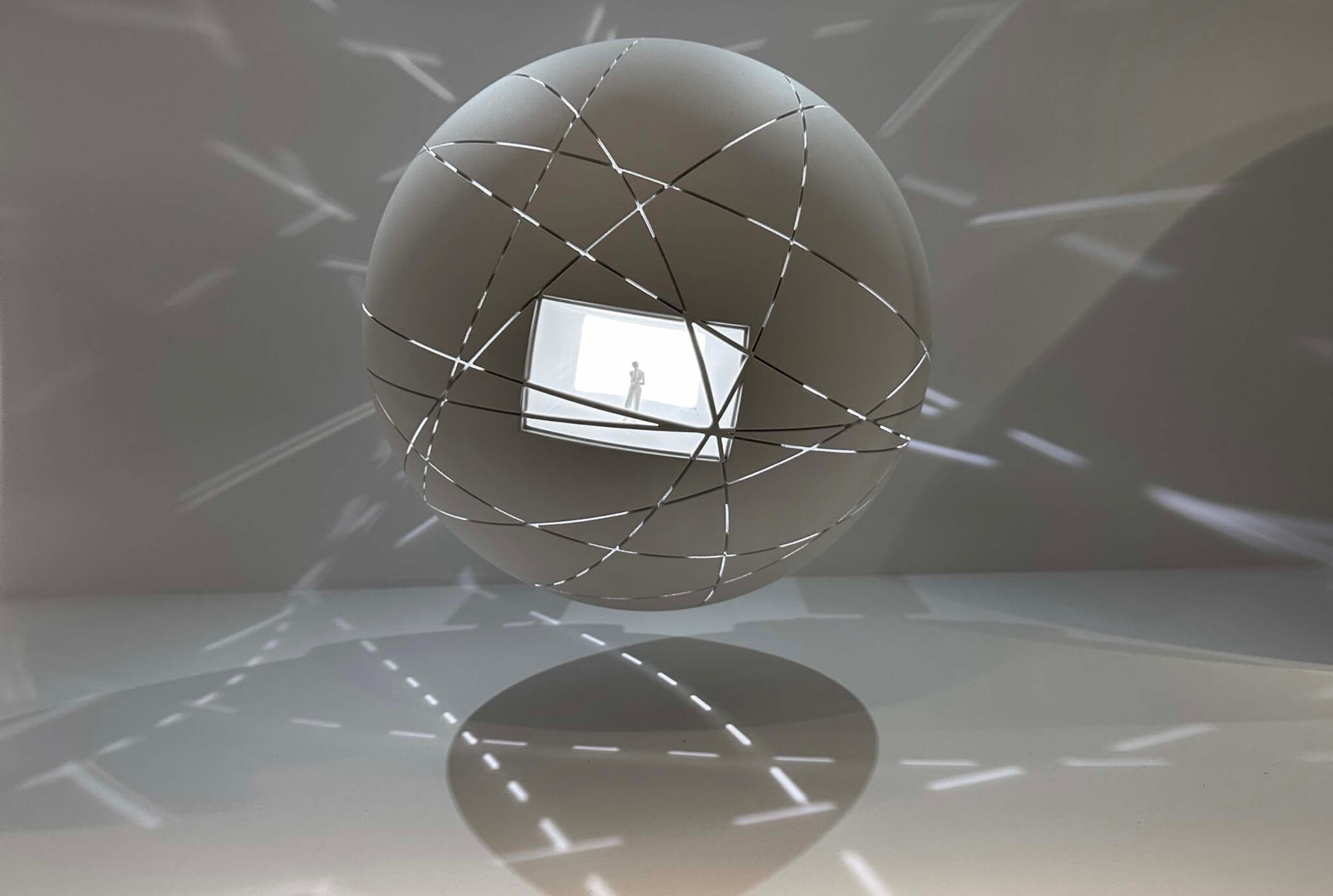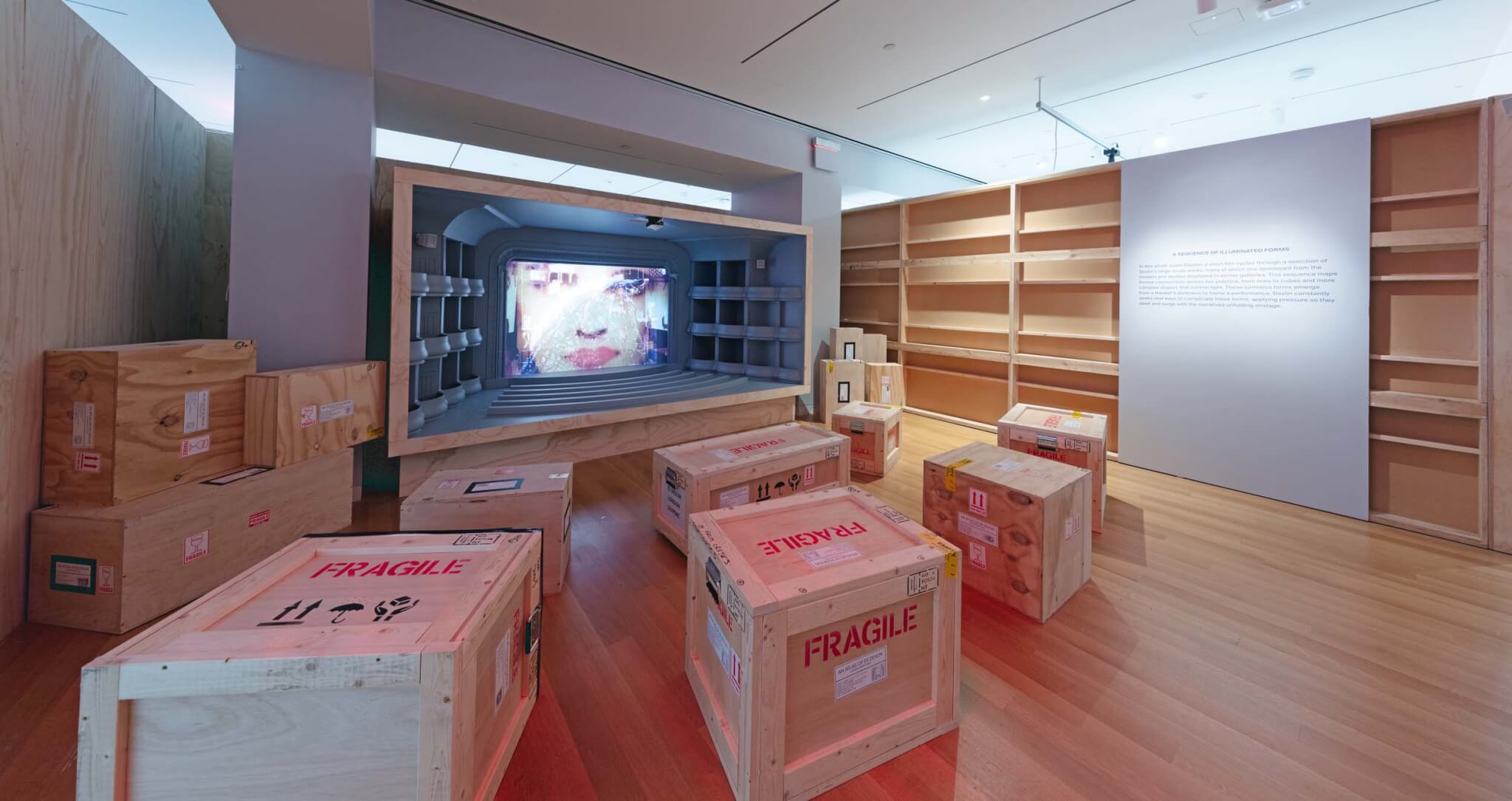[ad_1]
An Atlas of Es Devlin
Cooper Hewitt, Smithsonian Design Museum
2 East 91st Road, New York
Via August 11, 2024
The studio go to is without doubt one of the perks of being a museum curator. It’s a chance to see what’s preoccupying an artist—the books they’re studying, the issues they’re sketching out, the chances and ends that they’ve picked up. It gives a less-polished view into how a artistic determine thinks, with the false begins and lifeless ends the general public by no means sees displayed alongside recognizable successes. And due to this, it probably reveals extra honesty about who the artist is. “It’s a curator’s completely happy place to be surrounded by the aura of objects,” mentioned Andrea Lipps, one of many organizers of An Atlas of Es Devlin, on view on the Cooper Hewitt, which facilities on the groundbreaking work of the British set designer. “There’s an immediacy to drawings, sketches, and issues that the artist’s hand has touched.”
Despite the fact that Devlin, now 52, isn’t a family identify, her shoppers actually are: Beyoncé, Adele, Rihanna … the record goes on. Although she is without doubt one of the most generally seen artists of her technology, the Cooper Hewitt retrospective is without doubt one of the uncommon occasions Devlin has been acknowledged as the primary character. Since opening her studio almost 30 years in the past, she has designed over 400 tasks, spanning phases for stadium excursions, a closing ceremony for the Olympics, Tremendous Bowl halftime performances, theatrical festivals, and runway exhibits. As Devlin described within the 2017 Netflix collection Summary: The Artwork of Design, she feels an innate drive to fill the world with artwork. This consists of monumentally scaled sculptures (like a 30-foot-wide mannequin of New York Metropolis’s skyline twisted into an egg-shaped orb); constructing kinetic units, like her Tony-winning idea for the play The Lehman Trilogy, which consisted of a rotating modernist glass workplace; and exploring new know-how, like projections and generative AI. Her public installations have graced Trafalgar Sq. and Lincoln Heart. “She’s all the time creating the scaffolding for others to carry out on and to inform their tales,” Lipps mentioned, “and that is the very first time that she was creating it for herself.”

It’s becoming, then, that the prelude to the exhibition takes place in a duplicate of Devlin’s studio. The room is dimly lit, all white, and wrapped in floor-to-ceiling bookshelves holding paper fashions, storage packing containers, and trinkets. There’s a large desk within the middle of the house strewn with eraser shavings, cups brimming with rulers and pencils, clean notebooks, and manuscripts. Quickly, photographs of Devlin’s notes and drawings are projected on the desk and a video begins to play on a clean wall in entrance of it. We see Devlin’s personal arms drawing and reducing paper as she narrates, in a soothing and breathy voice, the story of who she is and the way she thinks. Because the movie concludes, the clean wall reveals itself to be a door that slowly opens to the exhibition past it.
“There was very a lot a want for the exhibition to really feel intimate, to really feel such as you precisely have stepped into this house of the artist, that you’ll be able to catch a glimpse of issues past the completed shiny product,” Lipps mentioned. “You get to see a few of the messiness of it.”

Whereas Devlin’s medium may be units, she is foremost a designer of experiences. The outcomes of her works are a feeling, and he or she makes use of photographs, structure, mild, and sound to evoke it. She is understood for creating area spectacles (her newest is U2’s residency on the Las Vegas Sphere), however her curiosity in designing experiences began at a way more intimate scale.
Devlin remembers strolling down the hall of a music college as a baby (she studied violin for a bit of bit) and listening to snippets of performers enjoying Bach, Led Zeppelin, and Miles Davis by way of the glass doorways of observe rooms. “Fragments of music, mild, and environment coalesced into one thing new and unnamable,” she wrote in a catalog accompanying the exhibition. She now sees her total profession as an extension of that hall.
What Devlin is describing in her childhood reminiscence is awe. And that’s what I felt the primary time I knowingly skilled one in all her installations, the 2016 Mirror Maze. It was a collection of rooms that included a seemingly countless labyrinth of reflections bouncing down and round a hall bathed fully in purple mild and perfumed with Chanel perfume. A movie was projected onto a 360-degree display set over a reflecting pool. Whereas many people outgrow a way of surprise with the world, or discover it more durable to search out as we age, Devlin has been capable of harness this manner of seeing and invitations us to expertise it along with her.

Like all of Cooper Hewitt’s exhibitions, An Atlas of Es Devlin is meant for a large viewers, from college teams who’re coming to the museum for a discipline journey to design professionals who’re wanting to study extra about their friends’ craft. Due to this, the exhibition operates on a number of ranges: It’s a reacquaintance to Devlin for individuals who could have skilled her work with out realizing it, an introduction to the style of design for stay efficiency, and a take a look at inventive course of. However what I discovered to be most revealing was the design of the exhibition itself, which she personally created for the museum.
The precise problem of exhibiting spatial design in comparison with extra conventional mediums like portray or sculpture or movie is that what somebody sees in a gallery is sort of all the time a translation, not the actual “factor,” or artifact. We gaze on the scale mannequin, learn the ebook, and look at images to approximate what it’s wish to be inside the house that can not be there. The inherent ephemerality of Devlin’s work is an added layer to the problem of exhibiting it. As Devlin mentioned within the exhibition’s opening movie, “Each viewers is a short lived society that departs a efficiency in an altered state, the structure of their thoughts redrawn.” As soon as the present is over, the stage is discarded. What’s left is the impression of being there.
Nonetheless, as a result of Devlin’s work is so experiential, the exhibition of her work is remarkably profitable. Whereas it’s unattainable to re-create the 60-foot-tall rotating cubic screens she specified for Beyoncé’s Formation tour or the 80-foot-tall arms holding a deck of playing cards she created for the Bregenz Pageant’s manufacturing of Carmen, we see mirrors, projections, and experiments with scale within the gallery. On the coronary heart of her designs is the metaphor of a “reminiscence palace:” a method for recollection that argues concepts are greatest remembered when they’re situated in house. All her designs are environments which are bodily analogues for the content material of the performances that occur inside them. As I walked by way of An Atlas of Es Devlin, I felt as if I have been a voyeur in Devlin’s personal reminiscence palace, a participant in an immersive efficiency of her persona as a artistic visionary.

The exhibition is an archive of greater than three many years of Devlin’s artistic output. The descriptions accompanying the sketchbooks and presentation fashions are written in first particular person, imparting a deeper sense of intimacy with the work. Devlin defined how her first design for a live performance was in response to being bored. She shared many anecdotes, like when Woman Gaga’s suggestions on an idea was “Now vomit on it,” main her to supply junk from a dump to roughen it up. We get a way of her wide-reaching references, from Japanese woodcuts for a U2 stage to Fritz Lang’s movie Metropolis for the Weeknd’s After Hours til Daybreak tour. Lipps mentioned, “She has this capability, then, to essentially distill all the things right into a singular gesture or kind or thought that may carry a efficiency by way of.”
The exhibition ends with three movies that depart from Devlin’s work for the stage, turning to have interaction nature and the interconnectedness of our surroundings, as if to say the spectacle is throughout us, not simply within the orbit of the celebrities for whom she designs. Over the previous ten years, Devlin has been producing installations that grapple with environmentalism, particularly the lack of biodiversity. I puzzled what she thought of her trade’s environmental impression, particularly because it’s depending on short-term constructions and the carbon price of air journey. Now that may get on the type of messiness that reveals one thing.
Diana Budds is a New York–based mostly author and editor thinking about how design reveals tales about historical past, tradition, and coverage.
[ad_2]
Source link



